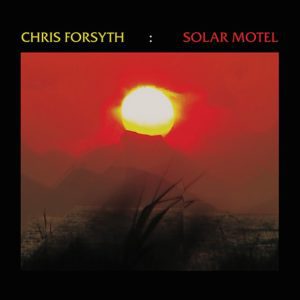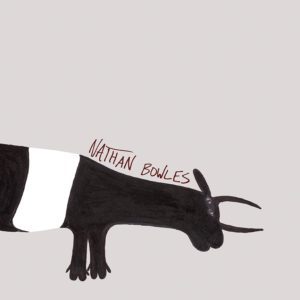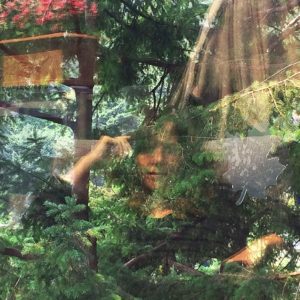A cinematic suite of contemplative, elastic set pieces conjuring the titular Virginian river/tribe/extinct county, the second solo album by Nathan Bowles (Black Twig Pickers, Pelt, Steve Gunn) deploys banjo, percussion, piano, tapes, and voice to explore the rugged country between the poles of Appalachian old-time traditions and ecstatic, minimalist drone. Featuring Tom Carter.
Highlights
- The second solo album by Nathan Bowles (Black Twig Pickers, Pelt, Steve Gunn) deploys banjo, percussion, piano, and voice to explore the rugged country between the poles of Appalachian old-time traditions and ecstatic, minimalist drone.
- Available on 150g virgin vinyl as an LP, with full-color inner insert and LP labels, as well as on gatefold CD and digital formats
- Vinyl edition includes digital download coupon
Physical format music purchases from the PoB webstore and Bandcamp include digital downloads when feasible. Some, but not all, pre-2023 vinyl pressings also include a download coupon. For digital preorders and high-resolution digital downloads, please visit our Bandcamp page.
Tracklist
A1. “Sleepy Lake Bike Club” 8.48
A2. “The Smoke Swallower” 2.47
A3. “Jonah/Poor Liza Jane” 7.12
A4. “Chuckatuck” 5.27
B1. “J.H. for M.P.” 3.11
B2. “Golden Floaters/Hog Jank” 9.55
B3. “Sleepy Lake Tire Swing” 10.14
Catalog Number/Release Date
PoB-016 / November 18, 2014
Purchase from PoB above or support via
- Bandcamp (LP/CD/digital)
- Other Options (LP/CD/digital/streaming)
- Local Record Stores
More from Nathan Bowles
-
Weight N/A FORMAT Album Narrative
- Photo by Constance Mensh.
- Photo by Constance Mensh.
- Photo by Constance Mensh.
It does not seem to me … that we understand the laws governing the return of the past, but I feel more and more as if time did not exist at all, only various spaces interlocking according to the rules of a higher form of stereometry, between which the living and the dead can move back and forth as they like … – W.G. Sebald, from Austerlitz (2001)
Nansemond is the name of a fading dream as much as it is a place name; the word has largely disappeared from maps of Virginia. The eponymous American Indian tribe, once part of the Powhatan empire but now numbering only 200 members, lent its name first to the Nansemond River, and later to a now-extinct county incorporated in 1646 but renamed in 1974. This region of tidewater Virginia was once predominantly underwater, beneath the blackwater and cypress groves of the million-acre Great Dismal Swamp, since drained to a mere fraction of its former span. Escaped African American slaves, as well as subjugated Nansemond Indians, took to these vast swamplands as fugitive maroons, lying out in secret settlements amid the labyrinthine morass. Now Nansemond is a ghost-choked locale, the tendrils of its spectral swamps grasping for purchase among parking lots, subdivisions, and peanut farms.
This is the wetlands landscape Nathan Bowles conjures with the cinematic suite of contemplative set pieces on his remarkable second solo album. Although he now resides in mountainous Southwestern Virginia, in a crucible of old-time music, he grew up on a body of water improbably called Sleepy Lake, on an estuarine peninsula surrounded by the Nansemond and James Rivers and Chuckatuck Creek. Nansemond aims at reconciling childhood memories, historical narrative, and recent life-changing events by revisiting the changing sites that connect and punctuate those hazy temporal nodes, both real and imaginary. It’s a record deeply engaged with how our memories colonize and transform a sense of place.
Although his recent solo recordings prominently feature his virtuosic banjo, Bowles is also widely recognized as a drummer, and he considers himself first and foremost a percussionist, with banjo as a natural extension of his interest in percussive drone. The seven songs on Nansemond deploy banjo, percussion, piano (his childhood instrument), tapes, and—for the first time—his robust voice to explore the rugged country between the poles of Appalachian old-time traditions and ecstatic, minimalist drone, moving effortlessly between composed sections, improvised passages, and field recordings. This forking-path approach follows his wide-ranging work as an ensemble player with the Black Twig Pickers (banjo, percussion), Pelt (struck and bowed percussion), Steve Gunn (drums, piano, banjo), Hiss Golden Messenger (banjo), Jack Rose, and others. For this record, he has assembled a sensitive group of collaborators from beyond the rosters of those groups: Tom Carter (guitar), Joe Dejarnette (guitar), Steve Kruger (fiddle, voice), and Jason Meagher of Black Dirt Studio (recording, production, mixing.)
Whereas his debut solo record A Bottle, A Buckeye (2012, Soft Abuse) concentrated on cracking the harmonic, rhythmic, and compositional possibilities of five-string banjo played in its deeply traditional, rhythmically specific clawhammer style, Nansemond expands the scope and scale of investigation exponentially. While still carefully articulating the subtleties of the banjo’s timbre, these new songs demonstrate the elasticity of Appalachian and Piedmont stringband music and the inherent connections, when those forms are distended, dilated, and dissected—as in the “Sleepy Lake” pieces, “Chuckatuck,” or “Golden Floaters/Hog Jank”—to contemporary improvised and post-minimalist avant-garde music. On this new set, Bowles digs deeper into the banjo’s fascinating nexus of African and European sonic cultures and its bridge between the menacingly alien and comically familiar vectors of Southern song, embracing its strange double life as preferred accompaniment to the most bone-chilling murder ballads and trance-inducing, syncopated country blues alongside the bawdiest minstrel comedy and goodtime hokum. (In the process, he incidentally renders utterly irrelevant the instrument’s recent pop resurrection as a signifier of spurious overalls-and-newsboy-cap Americana earnestness.)
On Nansemond the folk tunes “Jonah/Poor Liza Jane” and “J.H. for M.P.” (aka “John Henry”), chosen by Bowles for their resonant, evocative, and open-ended lyrics, provide ballast for the more atmospheric, less linear paddles through further reaches of the Great Dismal. Bowles’ inventive playing somehow finds common ground between tradition-bearing masters like Dock Boggs, Dink Roberts, and Etta Baker and the outré compositional experiments and extended techniques of Paul Metzger, Clive Palmer, and Henry Flynt. But these two strains always feel purposefully and organically integrated, not distinct or hierarchical, and that elegant and novel elision is perhaps the most notable accomplishment of these hypnotic recordings: they respectfully refuse to accept the porous boundaries between Southern vernacular music and modernism. It’s a sound, and an attitude, that’s hard to find on a map.
Videos and Streaming
Acknowledgments
Nathan Bowles is like my spirit animal. When I bought A Bottle, a Buckeye off him at a Steve Gunn show (where he pounded out some amazing organic-style drums), I took it home and put it on the turntable, and it immediately took me back to the nostalgic sound of the old time and bluegrass records my dad played perpetually as I was growing up. You know, the real shit: no irony, just beautiful, ethereal blues licks and folk licks from the banjo… Of course, he’s got the modern edge too, and the experimentalism thing down, and it sounds totally modern as well. That’s why it’s so great. It’s not too much of either: old or new, just timeless. I took a video of him playing “The Cuckoo” backstage in Montreal (complete with me drunkenly singing the lyrics behind my phone), and the clip says it all. I guess that’s why he gets first place in bluegrass competitions when he gets back home to Virginia between touring. So when I got home between touring I showed it to my dad—the true test—and it blew his mind. My dad didn’t grow up in any DIY, or punk, or indie era. He just kinda knows about the older primitive stuff, and the classic stuff, and he knows the real shit when he hears it. So I guess I’m the next generation, and I know it’s the real shit too, so… beautiful then, beautiful now. Timeless.
– Kurt Vile
4 stars. A series of wry, sad, troubled, and mesmeric compositions imbued with a spooked and grainy Appalachian potency. It’s the longer, stranger cinematic wanderings that really capture the listener: rich chaparrals of deep buzzing color you could lose yourself in forever.
– Andrew Male, MOJO
Stunning. The album wanders from bluegrass toward a highly cinematic form of prairie psychedelia. It’s as if Bowles is directing a Terrence Malick film with just a handful of strings at his disposal.
– Steven Hyden, Grantland
Nansemond evokes Bowles’ swampy Virginia homeland with nuanced picking, waterlogged drones, rowdy vocals (a first) and an inspired duel with the electric guitar of Tom Carter, from Charalambides on “Chuckatuck”. Best of all, there’s “Sleepy Lake Tire Swing”, a culmination of Bowles’ downhome and transcendent adventures, that captures the same spirit as his mentor, Jack Rose.
– John Mulvey, Uncut
Mesmerizing! “America’s Instrument” — the 5-string banjo — has found a profound new exponent in Nathan Bowles. His writing for the instrument is exploratory, at times wonderfully dissonant and always soulful; his playing sure-footed and hypnotic. One of my favorite musicians playing today.
– Glenn Jones
There’s a deep distillation of Nathan Bowles’ musical past and present on his second solo album, Nansemond: from the old-time Black Twig Pickers to the abstract drone of Spiral Joy Band to the band that sort of splits the difference, Pelt. But Bowles also carves out his own corner of this clawhammer-banjo-based music and takes a portal through time while keeping one foot in the ether. Built on a hypnotic banjo melody that drones more like a sitar than something out of Appalachia, “Chuckatuck” sounds like something recorded in a bunker and long since forgotten.
– Lars Gotrich, NPR All Songs Considered
Bowles sounds like he could play forever without boring himself or anyone listening. He attacks his strings boldly and sharply, yet he continually adds small variations and minute adjustments, viewing each iteration of a chord or phrase from a slightly different angle. This subtly-evolving consistency creates an intriguing blend of comfort and tension. You can settle your ears into Bowles’ grooves, or you can lean to the edge of your seat wondering what little shift will come next. Often, you can do both at the same time… Think of this record as a musical river—a flowing body of work that’s dependably solid and rippling with variation. For Bowles, the rich potential of simple traditions is as crucial as the water that fills a stream.
– Marc Masters, Pitchfork
Nansemond is an important progression for Bowles, a confident step beyond the elementary though endearing exercises of A Bottle, A Buckeye. If A Bottle, A Buckeye was a sequence of simple snapshots, Nansemond is where Bowles chips at a clear picture until it begins to break into abstraction. Nansemond should make it harder still to call him a solo banjo player.
– Grayson Currin, Wondering Sound
A stunner from start to finish. It’s a transporting collection of sounds that fuses age-old Appalachian traditions with cosmic drones, in the process creating something that sounds fresh and vital to these ears. The long, deep solo rambles that take up a good portion of the record are beautiful excursions that conjure up strange and spectral southern landscapes. Nansemond is mostly instrumental, but Bowles is nothing if not a storyteller, taking you on an evocative, transfixing journey.
– Tyler Wilcox, Aquarium Drunkard
Hypnotic. Like John Fahey, who conceived of American Primitive Guitar as a means of purging inner demons, Bowles has turned his emotions, memories, and preoccupations into a multifaceted work of art that can draw you in even if you don’t know a thing about the guy that made it.
– Bill Meyer, Magnet
Truly a revelation. It’s a supremely visceral, fried slice of backwoods Americana… an updated vision of traditional American song form without the pastiche.
– Other Music
Though these songs often start near a familiar folk base, they hurdle headlong into melancholy drones and noisy abstraction, sky-searching improvisation and reserved introspection. This dense, amorphous record reworks the past into an intentionally unsettled present. On Nansemond, Bowles finds a welcome, exciting midpoint between his work with the old-time band The Black Twig Pickers and the legendary long-tone ensemble Pelt. It pushes him from the place of solo instrumentalist (these days, a dangerous and busy field) into arranger and conductor of one.
– Grayson Currin, Independent Weekly
Channels streams of African-American, European and Native American traditions into [an] ecstatic Appalachian clawhammer trance. Nansemond is, somehow, an entirely original and contemporary album of deeplyrooted, old-time banjo music. It’s going to take more than a few repeat listenings to try to fathom that mystery out, and this stuff is as sweetly satisfying and addictive as that old Golden Virginia.
– Ian Anderson, fRoots
The avant-folk underground’s favorite banjo player–yep–stretches out. The ghost of his old cohort, Jack Rose, loiters approvingly.
– Uncut
A banjo in the hands of Nathan Bowles can turn Appalachian hillbilly dirges into cosmic droning cinematic wonders.
– Tiny Mix Tapes
A concerted drone wavers through Bowles’ jaunty picking, partially inspired by 20th century avant-garde ideas, but still drawing from rural America.
– Dave Cantor, Paste





















